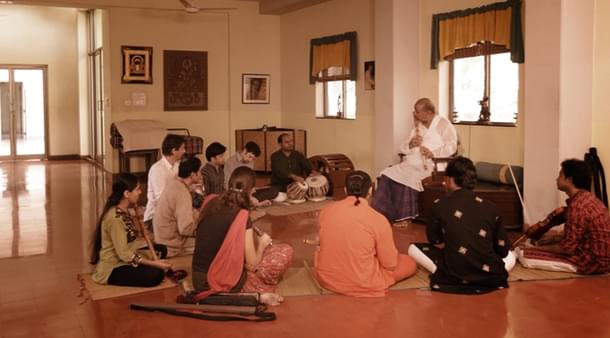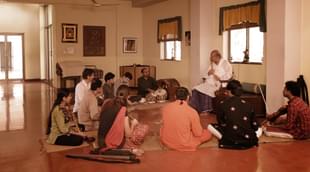Culture
Learning Music - A Guru Is More Than A Teacher
R Vasudevan
Nov 11, 2014, 02:31 AM | Updated Feb 10, 2016, 04:59 PM IST
Save & read from anywhere!
Bookmark stories for easy access on any device or the Swarajya app.


A teacher teaches music – the curriculum, the techniques, the methods and so on, but a Guru teaches how to approach music: how to understand it, how to internalize it and how to enjoy it.
When one thinks deeply about the purpose of music and its impact, it certainly throws up myriad thoughts – what is music, what is it supposed to do, why different people react to different types of music in different ways, and so on. Last but not the least is how one learns music and how one expresses it. The question “what is music supposed to do” can perhaps offer some insights into the other questions that are raised about music.
What is music supposed to do?
It’s a question which may be answered differently by different people, but one thing which most people will agree on is that it acts as a trigger to your emotions – be it happiness, sadness, anger, calmness and so on. The flow of the river, chirping of birds, the rhythmic movement of deer or fish, the dancing peacock, a hunter stalking it’s prey – all have music built into them.
If this is the case, how do you approach (learn) music? (From here on, I specifically refer to classical music forms) How do you learn to express emotions through music and enjoy it? Is it through continuous learning, the techniques, the rigorous practice (sadhakam) or a combination of all?
Surely, learning and practice are very important; but what do you learn and how do you learn? Learning whatever the teacher/ trainer/ instructor teaches you, practicing it hundreds of times and employing all theoretical techniques will lead you only up to a certain point. There is something more required in this quest – a realization of truth, about yourself – who/ what you are, for music is not just about external beauty but also inner realization and beauty.
How does one achieve this? A mere handful achieve this on their own (I am making this statement based on people I know). There is an external guide or trigger required for many people to realize this; this is where, I feel, the role of a Guru comes in (I wish to use the word Guru, meaning a leading light/ guide or an authority who is a sounding board and in no other sense).
Indian classical music is also not notation music and requires the understanding of ragas which are not mechanical note (swara) combinations. This requires a deep understanding of the movements within and in between the notes, and the experience of a raga, which a good Guru is able to comprehend and communicate.
I would like to share my experience as a student studying under a Guru (not necessarily staying with my Guru, but spending most of the time with him, when I started learning Carnatic music), and how it helped me to understand music.
I don’t remember having specified classes or timings in a week with my first guru. It used to be a continuous four or five hours with him on weekdays and more on some weekends. The sessions were not just about music but about philosophy, spirituality, religion and so on. The learning came not from classes but from the general experience of listening to him talk, hearing him sing with utter devotion and observation. He never used to impose ideas, though he had his own views of things; he would start off a thread (in singing or discussions) and we students would take it from there; he would silently listen and nod his head when he agreed.
There was minimum learning in the classes – it used to be more about watching him teach other students, or travelling from one place to another for his concerts or in his discussions with other artistes/ scholars who used to visit him at home. He used to encourage us to go and listen to his peers and other musicians as he believed there are good things you can take from any musician (be it a maestro or an upcoming musician or a student).
I have never heard him speak condescendingly or critically about any musician, which is an important lesson he taught us. We were asked to sing in ways that were natural to us and our voice (“Be what you are”). We were asked to enjoy our music.
He used to say: “If you want to enjoy your own music, remove your ego and submit to music.” This, in a certain sense, is true – if one is clouded with thoughts and “I”, the TRUTH gets hidden. My realization/ experience about quite a few things what he taught came later with age and maturity, but he set the platform for this experience and maturity to lead to self-realization on music.
A teacher teaches music – the curriculum, the techniques, the methods and so on, but a Guru teaches how to approach music: how to understand it, how to internalize it and how to enjoy it. The guru also makes one understand how it is an extension of who you are (and your personality). She/ he does not impose her/ his views nor believes that what she/ he says is the final word, and lets you explore and find things for yourself.
Music is a lifelong pursuit and its emotions start sinking into you with more internal growth of the self (for which the Guru is an enabler). At a certain phase in this pursuit, you become your own Guru.
A postgraduate in engineering from the Indian Institute of Science, Bangalore, with more than two decades of experience in the software industry, Vasudevan Ram is a highly-acclaimed exponent and teacher of Carnatic music.





